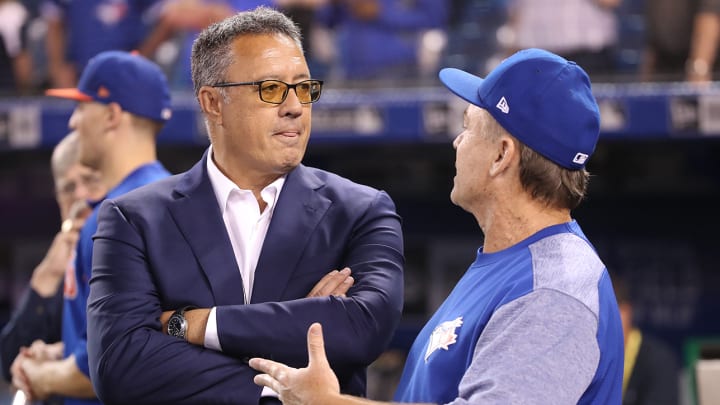Mets Broadcaster Ron Darling Is Back in the Booth with a New Perspective

New York Mets broadcaster Ron Darling arrived at Citi Field for the team’s first home game this season in a daze. Five months earlier, back in November, the 58-year-old had first noticed something wrong when he couldn’t complete his normal workout routine—and then when he couldn’t remember getting home afterwards. Doctors would later diagnose him with an embolic stroke, and further tests revealed a mass near the top of his chest.
When he returned from spring training, follow-up scans showed that the mass had grown, which is why docs spoke with Darling hours before New York’s home opener to tell him he’d need surgery. The ultimate diagnosis was thyroid cancer.
On Opening Day, Darling initially only told SNY colleagues that he’d be slightly late to the ballpark. He was still processing the news as he headed to work. But after calling a 4-0 loss to the Nationals, he opened up to his longtime boothmates Gary Cohen and Keith Hernandez. “I said, ‘Hey guys, I’ve got to tell you something,’” Darling recalled. “That was the first time I ever got emotional. It was very, very strange. I could barely spit it out.”
A little over a week later, during the fourth inning of an 11-7 loss in Atlanta, Darling passed the news on to viewers. “I’ll kick its you know what,” he said.
Just a couple years earlier, Darling’s father had been diagnosed with colon cancer. At first it was considered inoperable, but experimental therapy allowed surgeons to remove the growth. Now 80, the elder Darling was just returning to full health when his son received his diagnosis. “It was kind of surreal,” Darling said.
“When you’re a former athlete, you think part of you is immortal,” he said. “You suddenly realize you are very mortal. My first thoughts weren’t about cancer. My first thoughts were, I’ve got a young son, I’ve got a wife, brothers, a mom and a dad. My thought was, How do I get better?”
What was supposed to be a two-hour operation ended up taking six as surgeons removed a softball-sized tumor, and Darling was left without his voice afterwards. Pain made the next few weeks difficult—”I wouldn’t say that was my favorite time,” Darling said, playing down the hardship as he is wont to do.
“Ronny is a very old school tough guy,” SNY senior coordinating producer Gregg Picker said. “I don’t think any of us on the team, as close as we are to him, know the half of what he had to go through.”
Over the course of his six-week absence, Darling and SNY reportedly received 5,000 get well messages. “The sad part about cancer is that almost everyone is affected by it,” Darling said, “so everyone who would contact me would say, My sister had thyroid cancer or He had this or that, and now he’s been in great health for the last 15 years.”
During his time away, Darling was able to spend more time with his family than he was ever could in past seasons. “Eating with my family every night, that was a really nice part of it,” he said. “Now that I’m back to a full schedule, occasionally I think about how they are home barbecuing and I wish I was there.”
However, when Darling returned to his post in June, he said, “You don’t realize until you’re away how much this is in your blood.” He was concerned about the tenor of his voice and his stamina early on, but Picker rarely saw an issue, especially after the first few minutes of any given broadcast.
“I remember being ecstatic that he was back in the booth,” Picker said. “We could do our thing and we could be whole again. You feel rather incomplete and you just don’t feel whole when you are missing someone like him.”
Darling now has the green light to work a full schedule as the Mets contend for a wild card. During the postseason, he’ll once again call games nationally for TBS. Only after all of that will he return for another set of tests, when doctors will determine what, if any, steps to take next.
“I’m not anxious about it,” Darling said. “I’m so busy doing my thing. To tell you the truth when you go through this, you spend so much time with doctors in hospitals, I’m really treasuring that I don’t have to see them.”
